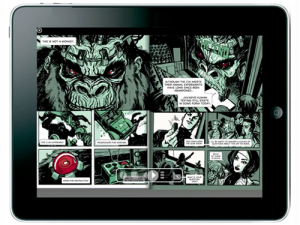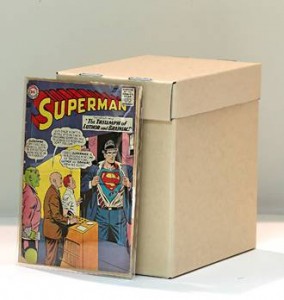“Real book” bookstores aren’t the only bookstores in peril of being taken down by technology. If you thought that just because comic bookstores survived the Amazon purge they were therefore safe from eXtinction, you are as stupid as Robin, when he allowed diabolically attractive Librarian Lydia Limpett to read him to sleep with her gaseous Sleepy-bye book (the only vaguely comic related reference I could think of).
There are fewer than 3,000 comic bookstores left in the United States – that may seem like a lot of comic books, but it’s down a third from their heyday in the mid 1990’s when there were more than 10,000. Savvy comic book publishers hope to take advantage of digital reading technology by integrating comics and eReaders, extending their sales to places where comic bookstores don’t exist. Like a 21st century digitalcomicbookmobile. Marvel Comics has developed a free application for the iPad that gives readers access to a digital library of more than 500 comics from its rich 70-year history (There is a Journey into Mystery: The Books That were Alive comic I would sure like to get my hands on without braving mean old comic book store guy). The software program, Marvel Comics App, developed by digital comics distributor comiXology, offers free access to the first issues of titles and vintage issues that can be downloaded for $1.99 each. Marvel’s claim that it sees the app as being complementary to the experience of buying and reading physical comics – rather than replacing it – seems dubious, but the software does include a location tool to guide you to the nearest comics store.
The design for the iPad comic reader seems so intuitive to reading comics, that it may be an anomaly in that the trendy device may actually enhance the experience rather than detract from it. The design is based largely on the aesthetic of the iBookstore, but upon inspection, it offers a reading experience that Amazon and it’s ebook competitors can’t even approximate: Immersive graphics in brilliant, inky color and a screen that seems like it was made for viewing comics. It’s upright viewing mode is like a traditional comics page, but at 7.5 inches instead of 10. Turning the iPad to landscape, you get different viewing options, like zooming in to the page and panels. KAPOW!
By bringing comics to the iPad, the good folks at Apple are banking on the idea that they will inherit the doggedly loyal comic book nerd fan base, and that that fan base will also appreciate the new medium – behold nerds, the conduit for reading comic books is a really cool new Apple product – and change the perception that comics are just for “collectors” (nerds). They may also, unconsciously be performing a far more valuable and far-reaching service: Eliminating what has always been the perceived destiny of the comic book collector: Eternal singledom by virute of the crap. Not just the comics but the storage boxes, de-acidification paper, protective mylar baggies and cardboard backing.
I will stand up and admit that despite my specs and the cut of my pants, I am not a high tech, modernist “geek”. I tried but I am the other thing, that no one dares identify themselves with. I am a nerd. Which leads me to the first problem I have with Apple’s experiment into the complex nether region of comicbooks: The misconception that “geek” and “nerd” are the same thing. The ADD afflicted technology geeks – who fall on the altar of Steve Jobs and wait in lines worthy of the grotto at Lourdes – are competitive, materialistic and highly receptive to new things, like a new thing every month. Their seeming bottomless pit of disposable income allows them to scrap their oldG versions of everything as soon as the newG thing comes out, and without the slightest bit of resentment or regret. Their need for newer, cooler, faster, better exposes a vanity so deep that it defies belief. With Apple’s prodding, many “hipsters” simply transfered their idea of cultural desirability from fashion to tech, and became ” technology geeks”, their objects of conspicuous consumption shifting from traditional displays of hipness and modernity to technology: iPhones, iPods, iPads. Comic Book “nerds” – inarguably not as well put together, but not as bad as they are made out to be either – have a deeper inner life, an intractable sense of individuality, substance and defiance. They are phenomenonally patient and have high levels of concentration. They have a much more intact sense of self. They are not swayed by advertisement or trends. They are opinionated and intransigent. They don’t need gadgets to tell them who they are.
Having no formal knowledge of comics but having been in and around collectors for the better part of my 20 year career in animation, the idea that you could integrate the nerdom into the geekdom seamlessly seems a really big leap of faith. When I was a student at SVA, the entire male student body would disappear and migrate to Forbidden Planet on New Comic Day (Wednesday?). Like a neighborhood Comic-Con minus the bullshit, New Comic Day was an experience, where fans gathered to pontificate about what they annoying insisted on referring to as “books”.
The real book readers have already spoken. They opted out of the “experience” of bookstore shopping in favor of the two-day-one-click. The comic book nerds may be as lazy as the traditional book nerds – and arguably more so in regards to cooking, dating, apartment hunting, coiffing and employment – but what they lack in skillet and social skills they more than make up for in tenacity, self- control and their desire to retain a sense of community to enage in. The deal sealer may be the fact that the iComics are protected and unshareable. Files are hidden from you and there’s no way to export comics for backup purposes like you can with music or video. You can’t share. Hence, there is a possibility that should the iComic gadget thing takes off, the loneliness and sequestration of the comic book nerd could actually be intensified. As if anyone could have ever thought that possible.



